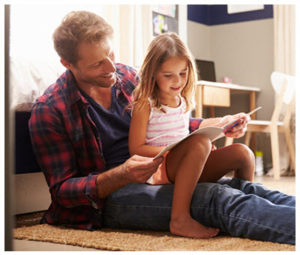Like many fathers in the 60s and 70s, my dad wasn’t around much when I was growing up. He was working, he was traveling, or he was playing golf. When he was home, he was watching sports on TV or reading the newspaper.
 He was an absence as much as he was a presence: He appeared at the dinner table, he loved the occasional argument, he was an affable participant at family functions.
He was an absence as much as he was a presence: He appeared at the dinner table, he loved the occasional argument, he was an affable participant at family functions.
He was there, but he wasn’t.
Even as I write those words, I recognize phrasing I’ve used for my ex-husband. Perhaps I have “daddy issues.” Or had.
My mother was such an overwhelming presence, it never occurred to me that my dad’s lack of involvement in my childhood might impact my relationships.
Sure, I heard the usual psycho-babble about dating a father figure when I was in my twenties; at the time I was going out with a 40-year old. Like most of the women I knew then, there was at least one “older man” in our formative romantic years, though as we matured, we increasingly dated men our own age.
And those daddy issues? Are they real? Are they relevant? What do daddy issues mean exactly?
What Are Daddy Issues?
Father-daughter relationships set the stage for what women will expect of men, romantically in particular. At least, so the psychological theory goes.
It’s logical enough, when you consider that this is the first man a little girl will interact with.
I read an article on Yahoo recently, summarizing several types of daddy issues as well as the typical consequences. Included are: the absent father, the absentee father, the missing dad, the terrible dad, and the overly doting dad.
The article draws from Psychology Today and other credible sources, clarifying the definitions of each problematic type of dad, as well as the respective repercussions. As you might expect, there are many – everything from mistrust of men to confused expectations to an overblown sense of entitlement.
My Father, My Ex?
My father?
By definition, he would likely fall into the “absentee” category – traveling, working, emotionally distant. In other words, there but not, with this as a result, according to the article:
… the father lived in the household with his family, but was often emotionally or physically missing a good deal of the time. Men who travel extensively or work long hours usually have less time to spend with their offspring… Like girls raised with absent fathers, these women frequently grow up with a skewed perspective of the male role in households. Some women ultimately seek out men who are emotionally distant.
 It’s strange to read these words and experience this epiphany so many years after my own divorce.
It’s strange to read these words and experience this epiphany so many years after my own divorce.
I don’t remember my father ever appearing at a special school event or a piano recital. I don’t remember my father at a birthday party or even reading to me at bedtime. Perhaps he did some of these things; I can’t find him in old photographs and I can’t find him in my memory’s snapshots of childhood.
Where my story veers from the predictable path is in the fact that my father and I formed a deep connection in the three years before his death. I met the man I married just over a year later. I was aware of how much my father’s work kept him away from home, and I swore that I would never tie myself up with a man who traveled.
The irony? My ex traveled a manageable amount when we married. The increase coincided with the birth of our first child – and never let up.
Where the article strikes with stinging accuracy: I never explicitly realized that I chose a man who was emotionally distant. I certainly never viewed our relationship in light of “daddy issues.”
Changing Times, Changing Awareness
I’ve worried for years about the way in which I was raising my sons and the fact that while they have a father, there was no positive, “active” presence of a man in or around the home in which they were growing up.
And if men are present – good men – isn’t that a plus for our sons and daughters alike?
One of the reasons I enjoy ongoing conversation with dads, not to mention the growing cultural conversation in which more men are speaking up on balancing work and family – is for the perspective they bring to our views of family in general and parenting in particular.
After all, don’t most of us model our gender roles based on what we’ve seen or experienced – by duplicating behaviors or purposely avoiding them?
I’m glad to see a cultural shift that allows men to be more engaged, that anticipates greater involvement – not dictatorship, not disappearance – but partnership in what we might think of as “family management.”
A Woman’s Confidence: Set by the Relationship with Her Dad?
I’m not sure I buy that a woman’s confidence or lack of it is set by that first relationship with her father. At least, not set in stone any more than any early experience prevents us from fully developing.
 Abuse? I believe it dwarfs us. We may overcome it. We may live with it. We may battle it throughout our lives.
Abuse? I believe it dwarfs us. We may overcome it. We may live with it. We may battle it throughout our lives.
Absence? Is that more or less benign in the long run?
I’ll opt for less benign, but that doesn’t mean it cannot have a significant impact.
Is the girl heavily influenced by the absence or presence of a father – and the way he relates to her as well as to her mother? That one I surely believe, though no two people respond alike to the circumstances of their upbringing.
Moreover, we all make mistakes regardless of the way we interact with our parents, and we do ourselves no favors when we blame them for the entirety of our less than stellar choices, not to mention our shortcomings.
We’re capable of learning from our past; we’re capable of self-awareness; we’re capable of breaking unhelpful patterns.
Yes, it’s easier said than done.
You May Also Enjoy
My relationship with my father when I was growing up had an enormous impact on me. I attribute many of the bad choices I made in men in my younger years to my need for approval that I didn’t think I had from my father. Virtually all of my issues with body image and food come directly from him, beginning when I was 6 – “do you really need that cookie?”
I could write a book…oh yeah, maybe I will!
Having said all of that , I made a brilliant choice in a husband, as I wanted someone very different from my father. And my father and I were very close once I was a parent myself. But voices of childhood are hard to stop hearing.
“Voices of childhood are hard to stop hearing.” So well said, Sharon.
For the longest time, my absentee dad, who chose work and his own life over his family, affected me in such a way that I was super paranoid about my partners. It wasn’t until two years ago, when I started talking to a therapist, that I really saw what my dad’s absence did to me and how it influenced my perception of my partners. That was also when I started to change, and today it no longer has a hold on me. But two years ago was also thirty five years in the making…That’s a long time to be burdened by daddy issues.
I was definitely shaped by my father’s absence and emotional distance. But I was aware of that and deliberately sought out a partner who was not that way. I have difficulty at times, though, not getting defensive of my emotions. Whenever I feel that my right to feel certain emotions is under attack — because it was that way with my father for so long — I start to feel the old anger coming back. Not helpful for relationship building.
Modern society is at odds with our human evolution as social creatures of family and extended family. Jobs with travel…forget it. My father could walk to work (irony is that it was hard — everyone stopped to offer him a ride). I’d sometimes walk and meet him mid-way.
I was away perhaps one or two weekends a year, and called nightly when the children were young. Knowing of my civil disobedience, one child was upset that I might have to “go away,” and I promised not to do arrestable actions, which reassured them and which was true while they were young. I’m not blaming those individuals who have no other work options — it’s the rotten system. But lots of us do have options — don’t let yourself get sucked into the rotten system. Financially, my experience has always been median family income. I interact with some very wealthy people whom I know well enough not to be the least envious of. Live cheaply, live at home with your family if at all possible. Time is priceless.
BLW, you appear to be a great parent. One good parent can be enough — wish you had had that experience yourself. But things are always recoverable, and Fran had a family experience with some similarities to your own. We all carry and exhibit our pasts to an extent, but it’s how we deal with this that counts. My father had very traditional New England-style parents, with a respected and socially responsible father who was so serious and sober in his good work as to seem somewhat stern and cold. My father’s response to that experience was to not copy his father’s approach but to do his best to be very loving and open with the family. Fortunate me.
Not demonstrative. Responsible. Quiet. These describe my father. He was home every night at 5:15, my mother had dinner on the table at 5:30, we were told not to bother him with anything until he’d had his dinner. He took us camping and boating and skiing – but he was not a talker. He was protective of his daughters. I don’t remember him ever telling us he loved us until recently. So, he’s a steady presence that kept his distance. We did not get along in my teen years. My mother said it was because we were so much alike. Now that I’m an adult – I can see those similarities. But I would have sworn she was wrong when I was younger.
In many ways that’s the kind of man I married – the second time.
We do learn, don’t we Barb. Fortunately.
Wolf,
My relationship with my father and witnessing his passing has influenced my decisions and impacted how I live my life. My father was present. He taught me how to ride a bike, took me to putt-putt golf, and let me cry on his shoulder when I perceived things not going the way I intended. The last 5 years of his life were consumed by cancer and his insistence that we keep it a secret. After some reflection, I’ve learned that this wish was detrimental to my own well-being. So now I am mired in ambivalence about his actions and have no way to address my own concerns with him. It is quite complicated to deal with daddy issues that I never expected.